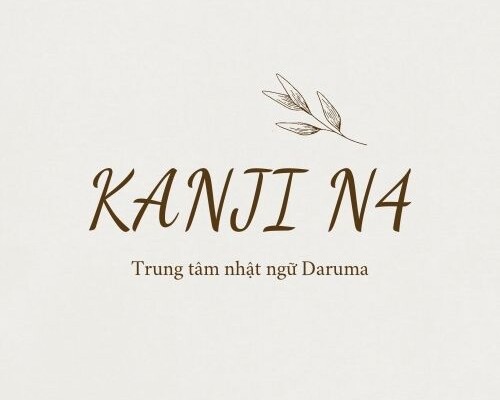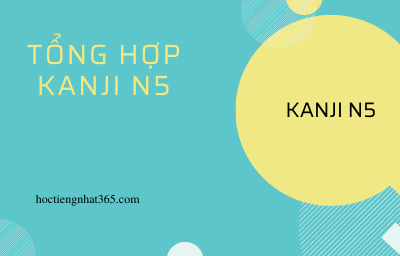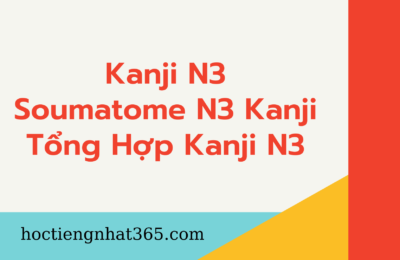Đây là bài viết tổng hợp về Kanji N5. Kanji N5 là một trong những Kanji…
Kanji N4 – Tổng hợp kanji N4
Kanji N4 – tổng hợp kanji n4 là bài viết tổng hợp những kanji N4 cần học để vượt qua kỳ thi JLPT N4
Xem thêm: lớp N4 cấp tốc
Kanji N4 – Tổng Hợp Kanji N4
| KANJI | Onyomi | Kunyomi | Ý nghĩa |
| 悪 | AKU, O | waru(i) | xấu xa |
| 暗 | AN | kura(i) | Tối, mờ ám |
| 医 | I | – | Y dược |
| 意 | I | – | Ý nghĩa |
| 以 | I | – | Có, lấy, giữ |
| 引 | IN | hi(ku), hi(keru) | Giám giá, dẫn dụ |
| 院 | IN | – | Bệnh viện |
| 員 | IN | – | Thành viên |
| 運 | UN | hako(bu) | Vận động, vận chuyển |
| 英 | EI | – | Anh ngữ, tiếng anh |
| 映 | EI | utsu(su), he(eru) | Ánh sáng |
| 遠 | EN | too(i) | Xa xôi |
| 屋 | OKU | ya | Mái nhà, căn nha |
| 音 | ON, IN | oto, ne | Âm thanh |
| 歌 | KA | uta, uta(u) | Bài hát, ca hát |
| 夏 | KA | natsu | Mùa hè |
| 家 | KA, KE | ie, ya | Nhà |
| 画 | GA, KAKU | – | Phim ảnh, truyện |
| 海 | KAI | umi | Hải ngoại, nước ngoài, biển |
| 回 | KAI | mawa(su) | Hồi đáp, lần này |
| 開 | KAI | a(keru), Hira(ku) | Khai mở, mở |
| 界 | KAI | – | Thé giới |
| 楽 | GAKU, RAKU | tano(shii), tano(shimu) | Vui vẻ, âm nhạc, vui |
| 館 | KAN | – | Hội quán |
| 漢 | KAN | – | Hán tự, trung quốc |
| 寒 | KAN | samu(i) | Lạnh lẽo |
| 顔 | GAN | kao | Khuông mặt |
| 帰 | KI | kae(ru), kae(su) | Trở về |
| 起 | KI | o(kiru), o(kuro) | Thức dậy, khởi đầu |
| 究 | KYUU | kiwa(meru) | Nghiêm cứu |
| 急 | KYUU | iso(gu) | Gấp gáp, gấp |
| 牛 | GYUU | ushi | Con bò |
| 去 | KYO, KO | sa(ru) | Quá khứ |
| 強 | KYOU, GOU | tsuyo(i), tsuyo(maru), shi(iru) | Mạnh mẽ |
| 教 | KYOU | oshi(eru), oso(waru) | Giáo dục |
| 京 | KYOU, KEI | – | Thủ đô |
| 業 | GYOU, GOU | waza | Doanh nghiệp |
| 近 | KIN | chika(i) | Gần, xung quanh |
| 銀 | GIN | – | Bạc, ngân hàng |
| 区 | KU | – | Khu vực |
| 計 | KEI | haka(ru), haka(rau) | Đồng hồ |
| 兄 | KEI, KYOU | ani | Anh trai |
| 軽 | KEI | karu(i), karo(yaka) | Nhẹ |
| 犬 | KEN | inu | Con chó |
| 研 | KEN | to(gu) | Nghiêm cứu |
| 県 | KEN | – | Tỉnh, huyện |
| 建 | KEN | ta(teru), ta(su) | Kiến trúc |
| 験 | KEN | – | Kiểm tra |
| 元 | GEN, GAN | moto | Sức khỏe |
| 工 | KOU, KU | – | Nhà máy |
| 広 | KOU | hiro(i), hiro(geru) | Rộng rãi, chiều rộng |
| 考 | KOU | kanga(eru) | Suy nghĩ |
| 光 | KOU | hikari, hika(ru) | Chiếu sáng |
| 好 | KOU | kono(mu), su(ku) | Yêu thích |
| 合 | GOU, GA | a(waseru), a(u) | Hợp, gặp |
| 黒 | KOKU | kuro(i), kuro | Màu đen |
| 菜 | SAI | na | Rau củ quả |
| 作 | SAKU, SA | tsuku(ru) | Làm việc, tác phẩm |
| 産 | SAN | u(mu), u(mareru) | Sinh sản |
| 紙 | SHI | kami | Tờ giấy |
| 思 | SHI | omo(u) | Suy nghĩ |
| 姉 | SHI | ane | Chị, em |
| 止 | SHI | to(maru), to(meru) | Dừng lại |
| 市 | SHI | ichi | Thành phố |
| 仕 | SHI, JI | tsuka(eru) | Vùng miền |
| 死 | SHI | shi(nu) | Chết, mất |
| 使 | SHI | tsuka(u) | Sử dụng |
| 始 | SHI | haji(meru/maru) | Bắt đầu |
| 試 | SHI | kokoro(miru), tame(su) | Thử nghiệm |
| 私 | SHI | watashi | Tôi, bản thân |
| 字 | JI | aza | Nhân vật, khu vực |
| 自 | JI, SHI | mizuka(ra) | Bản thân |
| 事 | JI | koto | Điều, vấn đề |
| 持 | JI | mo(tsu) | Sở hữu, mang theo |
| 室 | SHITSU | muro | Phòng |
| 質 | SHITSU, SHICHI | – | Vấn đề |
| 写 | SHA | utsu(su), utsu(ru) | Copy |
| 者 | SHA | mono | Người |
| 借 | SHAKU | ka(riru) | Mượn |
| 弱 | JAKU | yowa(i), yowa(ru), yowa(meru) | Yếu |
| 首 | SHU | kubi | Đầu, cổ |
| 主 | SHU | nushi | Ông chủ, chủ nhân |
| 秋 | SHUU | aki | Mùa thu |
| 集 | SHUU | atsu(maru/meru) | Tập hợp |
| 習 | SHUU | nara(u) | Học |
| 終 | SHUU | o(waru), o(eru) | Kết thúc |
| 住 | JUU | su(mu), su(mau) | Cư trú, sinh sống |
| 重 | JUU, CHOU | omo(i), kasa(naru), -e | Nặng |
| 春 | SHUN | haru | Mùa xuân |
| 所 | SHO | tokoro | Nơi chốn, địa điểm |
| 暑 | SHO | atsu(i) | Nóng |
| 場 | JOU | ba | Một nơi |
| 乗 | JOU | no(ru), no(seru) | Leo lên, cưỡi lên |
| 色 | SHOKU | iro | Màu sắc |
| 森 | SHIN | mori | Rừng |
| 心 | SHIN | kokoro | Trái tim |
| 親 | SHIN | oya, shita(shii), shita(shimu) | Bố mẹ, người thân |
| 真 | SHIN | ma- | Chân dung, ảnh |
| 進 | SHIN | susu(mu), susu(meru) | Tiến lên, tiếp tục |
| 図 | ZU, TO | haka(ru) | Bản đồ |
| 青 | SEI | ao(i), ao | Màu xanh |
| 正 | SEI, SHOU | tada(shii), tada(su), masa | Đúng |
| 声 | SEI | koe | Âm thanh |
| 世 | SEI, SE | yo | Thế giới |
| 赤 | SEKI, SHAKU | aka(i), aka(maru), aka(rameru) | Màu đỏ |
| 夕 | SEKI | yuu | Tối, chiều |
| 切 | SETSU, SAI | ki(ru), ki(reru) | Cắt |
| 説 | SETSU | to(ku) | Thuyết minh |
| 洗 | SEN | ara(u) | Tẩy rữa |
| 早 | SOU, SA | haya(i), haya(meru/maru) | Nhanh, sớm |
| 走 | SOU | hashi(ru) | Chạy |
| 送 | SOU | oku(ru) | Gửi, tặng |
| 族 | ZOKU | – | Gia đình, gia tộc |
| 村 | SON | mura | Thôn, làng |
| 体 | TAI, TEI | karada | Cơ thể |
| 太 | TAI, TA | futo(i), futo(ru) | Mập mạp |
| 待 | TAI | ma(tsu) | Chiêu đãi |
| 貸 | TAI | ka(su) | Mượn |
| 台 | DAI, TAI | – | Khung, cơ sở |
| 代 | DAI, TAI | ka(waru), ka(eru), yo, shiro | Thế hệ, tuổi tác |
| 題 | DAI | – | Tiêu đề, đề tài |
| 短 | TAN | mijika(i) | Ngắn |
| 知 | CHI | shi(ru) | Biết, hiểu biết |
| 地 | CHI, JI | – | Đất, trái đất |
| 池 | CHI | ike | Cái ao |
| 茶 | CHA, SA | – | Trà |
| 着 | CHAKU | ki(ru), tsu(keru), ki(seru), tsu(ku) | Quần áo, đến |
| 昼 | CHUU | hiru | Buổi trưa |
| 注 | CHUU | soso(gu) | Chú ý |
| 町 | CHOU | machi | Thành phố, quận |
| 鳥 | CHOU | tori | Chim |
| 朝 | CHOU | asa | Sáng sớm |
| 通 | TSUU | tou(ru), tou(su), kayo(u) | Thông qua |
| 弟 | TEI | otouto | Huynh đệ |
| 低 | TEI | hiku(i), hiku(meru/maru) | Thấp, thấp nhất, tệ |
| 転 | TEN | koro(bu), koro(garu/geru), koro(gasu) | Vận chuyển |
| 田 | DEN | ta | Ruộng, quê |
| 都 | TO, TSU | miyako | Thủ đô |
| 度 | DO | tabi | Thước đô, độ |
| 答 | TOU | kota(e), kota(eru) | Trả lời |
| 冬 | TOU | fuyu | Mùa đông |
| 頭 | TOU, ZU | atama, kashira | Cái đầu |
| 同 | DOU | ona(ji) | Giống nhau |
| 動 | DOU | ugo(ku), ugo(kasu) | Khởi động |
| 堂 | DOU | – | Nhà ăn. phòng ăn |
| 働 | DOU | hatara(ku) | Làm việc |
| 特 | TOKU | – | Đặc biệt |
| 肉 | NIKU | – | Thịt |
| 売 | BAI | u(ru), u(reru) | Bán |
| 発 | HATSU, HOTSU | – | Phát triển, phát âm |
| 飯 | HAN | meshi | Cơm, bữa ăn |
| 病 | BYOU | ya(mu), yamai | Bệnh tật, ốm |
| 品 | HIN | shina | Vật phẩm, hàng hóa |
| 不 | FU, BU | – | Thất , không |
| 風 | FUU | kaze | Gió, phong cách |
| 服 | FUKU | – | Quần áo |
| 物 | BUTSU, MOTSU | mono | Vật |
| 文 | BUN, MON | fumi | Văn, câu, thơ |
| 別 | BETSU | waka(reru) | Khác biệt, đặc biệt |
| 勉 | BEN | – | Chăm chĩ, học tập |
| 便 | BEN, BIN | tayo(ri) | Tiện lợi, thoải mái |
| 歩 | HO, BU | aru(ku), ayu(mu) | Đi bộ |
| 方 | HOU | kata | Cách thức |
| 妹 | MAI | imouto | Em gái |
| 味 | MI | aji, aji(waru) | Thưởng thức, gia vị |
| 民 | MIN | tami | Quốc gia, dân tộc |
| 明 | MEI | a(kari), aka(rui) | Sáng, thuyết minh |
| 門 | MON | kado | Cánh cổng |
| 問 | MON | to(i), to(u) | Vấn đề, câu hỏi |
| 夜 | YA | yoro, yo~ | Đêm nay |
| 野 | YA | no | Rau củ, cánh đồng |
| 薬 | YAKU | kusuri | Thuốc, dược phẩm |
| 有 | YUU, U | a(ru) | Tồn tại, có |
| 曜 | YOU | – | Ngày trong tuần |
| 用 | YOU | mochi(iru) | Sử dụng |
| 洋 | YOU | – | Đại dương, phương tây |
| 理 | RI | – | Lý luận, lý do |
| 旅 | RYO | tabi | Du lịch |
| 料 | RYOU | – | Món ăn |
| 力 | RYOKU, RIKI | chikara | Sức khỏe |
| 林 | RIN | hayashi | Rừng |
Nếu Bạn đã học xong N4 mà chưa giao tiếp tốt thì hãy tham khảo giáo trình shadowing nhé
Hy vọng bài viết tổng hợp Kanji N4 sẽ giúp Bạn ôn tập và học N4 hiệu quả hơn.




This Post Has 0 Comments